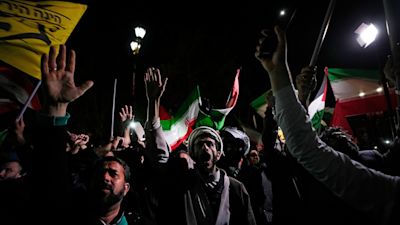Iran launches aerial attack on Israel: This is no longer a shadow war

This is no longer a shadow war.
For years, the conflict between Iran and Israel has been fought through Tehran's proxies and via surprise attacks carried out by Israel, which it never claimed responsibility for.
It has always been the fear of a devastating and unpredictable regional conflict that stopped both sides from escalating to the next level.
Everything changed last night with one of the largest drone attacks ever carried out by a military.
It became clear during those anxious hours that for Iran and for Israel the October 7 attacks and the war in Gaza have rewritten the rules which have prevented an all-out war.
We have been speculating about how Iran's 'revenge attack' against Israel might look ever since April 1 - when a suspected Israeli strike on the Iranian embassy in Syria killed seven senior Iranians officials.
There was a range of options available to Tehran - the one it chose was at the most consequential end of that scale.
It had been clear for almost a fortnight that Iran believed the attack against its diplomatic premises in Damascus required a huge response.
It was hoped that for Tehran, the fear of triggering a direct regional conflict with Israel would once again hold it back.
Or maybe it would opt for strategic patience, as it has before, by hitting Israel in an unexpected way some time in the future. It chose neither.
If Iran had left this to its proxies in Lebanon, Yemen, Iraq, and Syria to launch the attack, Israel might have been convinced to see this as temporary ticking up of their current actions rather than a major gear change.
Most encouraging for the prospects of de-escalation is that last night's attacks appear to have caused limited damage and casualties.
But this was a direct strike from Iran - by one nation state against another. It's unclear what will happen next.
Want a quick and expert briefing on the biggest news stories? Listen to our latest podcasts to find out What You Need To Know...